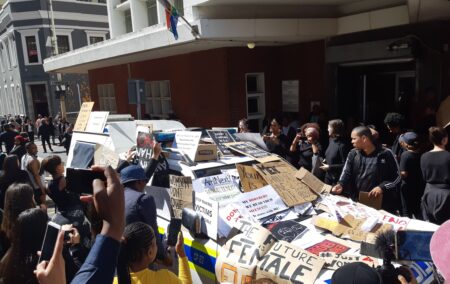There seems to be an added dimension of sadism and madness and bloodlust to our crime. Why?
I know the Clareinch Post Office well. It is across the road from Livingstone High School in Cape Town, where I taught in 1971. Last week, while I was staying in Claremont, I went there to send off a parcel. It was closed, and garlanded in flowers and posters, one of which read: ‘If God exists, she’s weeping.’
Only days before, 19-year-old University of Cape Town student Uyinene Mrwetyana had been raped and murdered in the post office by a Post Office official. The rape was pre-meditated, and the alleged perpetrator, who has previous convictions, has confessed. There was national uproar and mourning. On a radio programme, a black woman said, rather gently: ‘This happens every day in the townships and nobody says anything.’ She was not complaining about the flowers and weeping for Mrwetyana but the lack of flowers and weeping for all the others.
After this, elsewhere, we saw court scenes where a 21-year-old man confessed to raping a 7-year-old girl in the lavatory of a restaurant. Then we saw the latest crime statistics, showing an increase in assault, murder and rape.
The place where I grew up, Fish Hoek in the Cape Peninsula, is today stricken by murder and fear. Last week, following my standard, and now nervous, run on the lovely sand dunes, I came across a genial man of my age. He told me how in 2018, walking along the path between Sun Valley and the sports fields, he was attacked by a pleasant-looking young man, who tried to kill him by stabbing him with a screwdriver. He survived, but a month later, in March 2018, another man, Ian McPherson, was killed on the same path by the same assailant. Everyone is now too scared to walk the lovely mountains and dunes of Fish Hoek, where we as school children used to roam with complete safety, and even camp out at night.
Perhaps, as privileged white people, we were lucky to be safe, whereas the black majority has always lived in fear and danger. But I feel that the black majority now live with more fear and danger than they used to. There seems also an added dimension of sadism and madness and bloodlust to our crime. Why?
Poverty is not an explanation. Many countries poorer than us have less violent crime. Inequality is a better, if incomplete, explanation. Psychologists tell us that when poor men in a poor community see rich men in an adjoining rich community, they turn to violent crime against each other. This is because they know they can never achieve the status that the rich men achieve by showing women their fancy cars and clothes and spending power; so instead they seek status by turning to violence against each other. The gangster culture in the Cape Flats is a good example.
I think it is deeper than that. I feel our society is becoming deranged, and dark beasts in our psyches are becoming unleashed. Man is an exceedingly strange and irrational creature. We contain monsters. All the great religions were well aware of this, and all drew up elaborate rules and provisions to restrain our monsters. The great writers, such as Dostoevsky and Conrad, knew it too. So did the ancients, who drew up common law over centuries. Have we forgotten it?
South African family life is breaking down. The police force is impotent and corrupt. The rule of law is faltering. Our political leaders flaunt their wealth and corruption and contempt. The obvious remedies for our failing economy and catastrophic unemployment are disregarded by our rulers in favour of political expediency. And our monsters are set free.
The 1956 science fiction film, Forbidden Planet, began with Earthlings visiting a distant planet to try to discover the reasons for its catastrophe. On it had been a civilisation thousands of years more advanced than ours. It had discovered the ultimate technology and, following this discovery, the whole civilisation perished in a night. The technology had taken the thoughts and wishes of the people and converted them into the physical means of realising them. The inventors had over-looked the sub-conscious (called the ‘Id’ in those days). In the Id dwelt, often unknown to the conscious person, horrible lusts and jealousies and perversions, and sadistic desires for revenge. The technology converted the sub-conscious desires into actual physical monsters, which immediately ripped every inhabitant to pieces.
The key line, the greatest line I have ever heard in cinema or even theatre, is when the captain, desperate as the rampaging monster comes closer and closer, says to Dr Morbius: ‘That thing out there … it’s you!’
Are there some parallels for South Africa today? I don’t know if Forbidden Planet is the right place to look for answers but I’m sure it is much better than the Johannesburg Stock Exchange, where Friday’s ‘Shut Down Sandton’ protest against violence to women seemed silly and dishonest.
Why choose the JSE in Sandton, where women are probably safer than anywhere else in South Africa? Why not some callous and incompetent police station in a township? Or why not the headquarters of the Post Office?
Andrew Kenny is a writer, an engineer and a classical liberal.
The views of the writer are not necessarily the views of the IRR.
If you like what you have just read, become a Friend of the IRR if you aren’t already one by SMSing your name to 32823 or clicking here. Each SMS costs R1.’ Terms & Conditions Apply.

